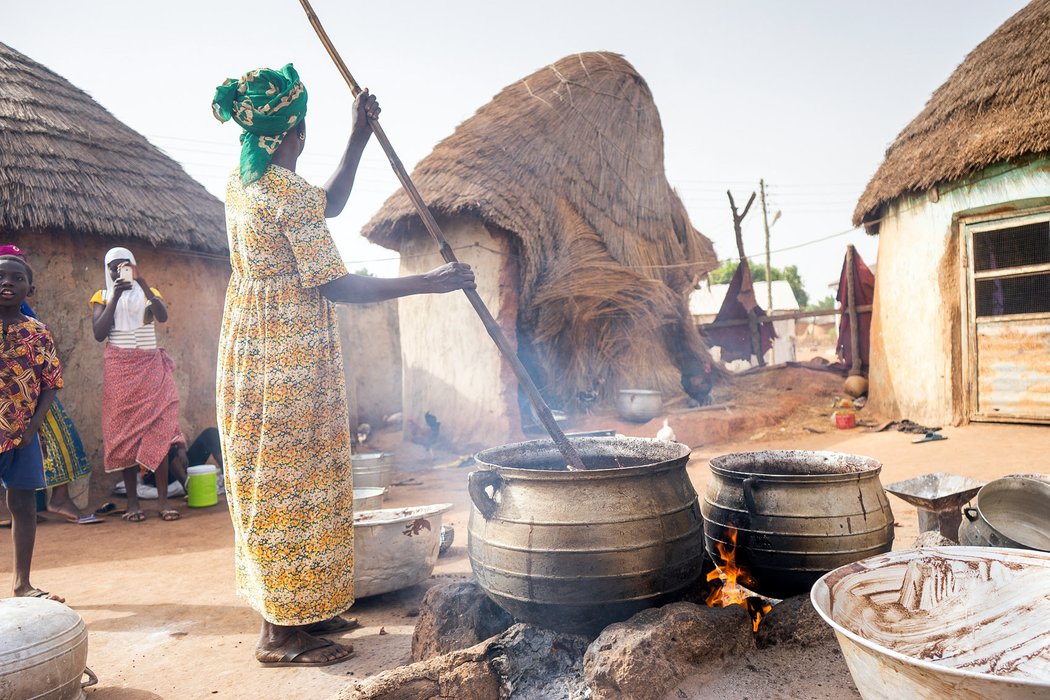Spinning Cotton and Making Butter: A Crafty Excursion from Tamale
Sometimes, I just feel stupid. Sure, I completed high school and graduated from college. I was even a Cub Scout! But my practical knowledge pales in comparison to the people of northern Ghana, all of whom seem to know how to create things which are immediately useful... with their hands! I might be able to write code, giving your website a blue as opposed to white background. But this little 80-year-old lady? She can mold a jar, make butter, and sew you an outfit, all before breakfast.

We signed up for an excursion with Ti-Kali, a company started by an enterprising young man named Walisu. Some years ago, he recognized early that the everyday lifestyle of his people was something that tourists might pay to see, and started running tours. Foreigners get a local experience, locals get foreign money, and everybody wins. We signed up for a tour of a small village where they make shea butter, mold clay pots, and spin cotton. Considering the tour's length of three hours, the price was incredible... and almost all the money makes its way directly to the villagers.
We love DIY tours, and given the choice will almost always try to get there on our own, arranging something directly with the villagers. We had already done that a few times in Tamale: at Kukuo #1, the leather workshops, and Kukuo #2. But there’s something undeniably superior about having a guide with you, especially in a place where you don’t speak the language. Walisu is a local, and everyone in town knew him. This eased our access, allowing us to ask “real” questions of the people… not just “What is your name?” But things like… “What’s the significance of that tattoo?”

This was a question we posed to the oldest woman in the village, who was crouched in front of us, teaching us how to mold a pot. While she worked the clay, I studied her arm, where an ancient tattoo was barely visible. Our guide translated my question, and she stopped working. Her eyes were bright as she stared at her arm, and a slight smile crept across her face. Eventually, she said it had been done in her youth, because it was beautiful. And then she returned to the pot. There must have a been a story, but I wasn’t about to press.
Clay we had seen before, so although it was fun to watch this old woman, we were more interested in the other activities going on around us. We entered the hut of another woman who was busy pulling, then spinning cotton around a stick. This was fascinating — I’d never seen it done before, and watching how the fluff is turned into string had something almost magical about it. She showed us the burial gown that she had just finished sewing for herself. Along with a wedding gown, this is the most important garment a woman will wear, and must be of utmost quality — she wouldn’t trust its creation to anyone but herself. Best to prepare it now, while she’s still fit.

Finally, we moved on to a compound of huts, where the activity was making shea butter. The shea tree is endemic to Western Africa, and the butter produced from its nuts has become popular around the world. Although it’s also used for cooking, its primary use is in cosmetics — especially shampoos — and is hailed for reducing itchiness and dry skin.
Unfortunately, we had missed the main part of the shea-butter production, and arrived when it was already boiling. This is the longest part, though, and the villagers have to stand at the pot for hours, constantly stirring and skimming off the oils that are released from the nuts. The oil is then filtered and purified, and will eventually solidify into the all-natural butter.
After the tour had officially concluded, we spent some time hanging out with the villagers on a huge bench which clearly serves as the town center. Jürgen got his drone out, which served its usual purpose as child-magnet, and I watched a group of guys get into a heated argument about local politics. Eventually, Walisu drove us back to our hotel. This was a wonderful day out, and we can definitely recommend the tours offered by Ti-Kali. If you’d like to have a similar experience, get in touch with them!
Walisu Alhassan: alwalisu@yahoo.co.uk











































Learn more about our travel project on Steemit by clicking on the banner above and join our community on Discord